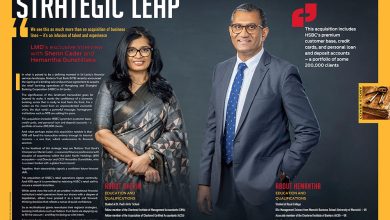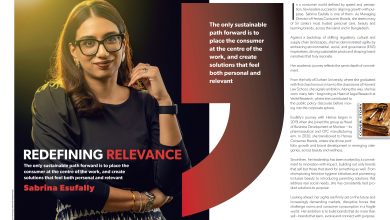COVER STORY
LMD EXCLUSIVE
CALM AMIDST THE STORM
Rohan Pethiyagoda believes that the nation is at the crossroads and it will be hard to avoid paralysis
Widely known for being a straight shooter, Rohan Pethiyagoda never fails to speak out against poor governance and social injustice. And his courage of conviction has seen him carve out a unique professional career.
A taxonomist, biodiversity explorer, conservationist and winner of the prestigious Rolex Award for Enterprise, he was until recently the Chairman of the Sri Lanka Tea Board and provided ballast to an industry beset by policy dilemmas.
“I am being outspoken and possibly suicidal. But I have tried for one and a half years, and not succeeded; and I know many other heads of institutions are in the same situation. We just cannot cut through the red tape,” he lamented not long ago when Ceylon Tea celebrated its 150th anniversary in August last year. And he added: “I ask you to put pressure [on them] because a lot of you are closer to politicians.”
It comes as no surprise therefore, that Sri Lanka’s state machinery lost the expert services of another highly qualified and clean professional because it continues to pay lip service to what ails this precious land.
In this no holds barred interview, Pethiyagoda speaks candidly about the state of the nation and its tea industry – a rare peek for readers therefore, into what makes him tick.
While singling out regulatory measures and policy initiatives that have served only to derail progress in the tea industry and the broader economy, he also asserts that the citizenry has a larger role to play in ensuring development. “It is not just the government that is to blame. We the people have hardly set a shining example,” he charges.
Moreover, Pethiyagoda points to his many misgivings regarding the state sector and endorses the view that government should play the role of regulator and facilitator while profit seeking business and industry is best left in the hands of the private sector.
As he notes: “The state’s job is to create a playing field and regulate it, not to compete with and undercut the private sector.”
As the recent local government elections proved, he says that “the government’s honeymoon is over and we’re looking at a period of political instability due to a highly empowered opposition straining at the leash. Unfortunately, this will lead to the government opting for low risk political strategies – it’s going to be hard to avoid paralysis.”
Indeed, Sri Lanka finds itself in a state of limbo at this juncture.
– LMD
Q: How do you rate the recent performance of the national economy and what is your forecast for the medium term?
A: I rate it ‘B-minus’!
On the one hand, the present government is struggling under the enormous burden of debt it inherited from the previous administration. On the other, the government’s ‘business as usual’ approach to governance has been disappointing. We have not seen the sweeping reforms that were promised. As a result, even against a basket of Asian economies, Sri Lanka is now significantly worse off in relative terms than it was at the time of gaining independence.
Our economy is still weighed down by state owned enterprises (SOEs). We have a national airline that is hundreds of billions of rupees in debt and dozens of loss making SOEs that need to be divested. Even the armed forces are operating hotels. Why? The state’s job is to create a playing field and regulate it, not to compete with and undercut the private sector.
Worse still, the government’s honeymoon is over and we’re looking at a period of political instability due to a highly empowered opposition straining at the leash. Unfortunately, this will lead to the government opting for low risk political strategies – it’s going to be hard to avoid paralysis.
But it is not just the government that is to blame. We the people have hardly set a shining example.
The response of sections of the media, unions and university students to the freedoms they won on 8 January 2015 has hardly been impressive. They’re simply inviting a totalitarian government, which is what I suspect they’ll get the next time around. Such indiscipline is suggestive of a society that lacks the will to succeed – we seem to eternally want to be victims and losers, and do not strive to be exceptional.

Q: What are the burning issues facing the nation today?
A: I’d principally flag the loss making SOEs and the issue of land title. We harp on landlessness but then the state hogs most of the land. The value of unutilised and encroached state owned real estate probably runs into the trillions of rupees. These idle assets should be mobilised or sold to corporates or individuals who will put them to use.
Perhaps most egregious of all however, are the whimsical policy shifts government has made: regarding the Colombo International Financial City (CIFC or Port City), weedicides, asbestos, plastics, tea imports and the like. These policies have nearly wrecked the concerned industries and sent terrible signals to potential investors.
 Q: Is Sri Lanka an attractive investment centre – and which sectors of the economy are ripe for investment?
Q: Is Sri Lanka an attractive investment centre – and which sectors of the economy are ripe for investment?
A: As much as the state has failed dismally in several sectors such as the plantations economy, housing and transportation, other sectors are relative to our economic standing among the best in the world.
I would single out healthcare, education, apparel, telecommunications and agriculture for particular praise – they have been transformative and possess fantastic human capital, which can attract more investment. But the main factor investors really crave is stability – and that is something our system of government simply doesn’t offer.
Q: Which global trends are likely to impact Sri Lanka?
A: Disappointingly, we’re still lagging behind the IT wave. E-commerce is still in its infancy.
We need to begin teaching coding (JavaScript) to our teenagers. Today’s economic powerhouses of the world are built on services, not production industries. The small size of our domestic market makes industrial production additionally challenging. But given our educational advantage, maybe we could – with a little imagination – number among the few countries to leapfrog directly from an agrarian economy to a service economy, bypassing industrialisation.
Q: A lack of innovation has continued to undermine the tea industry – is this likely to change?
A: I disagree. We see many local companies whether giants or startups taking clever tea ideas to the world. Perhaps e-commerce needs to penetrate the industry further to cater to consumers’ desire for ‘instant gratification.’
For this, fulfilment and warehousing operations in major markets will be mandatory. I have been nudging exporters in that direction even offering funding from the Sri Lanka Tea Board; however, the response has been underwhelming.
Q: What are the core issues plaguing plantation workers?
A: The biggest issue is them being forced to live and work within an outdated social model. They are maintained as a captive workforce, resident on estates, unable to own land (there is no land to own), separated from mainstream society and deprived of the urban lifestyle to which most Sri Lankans aspire.
Why should the child of an estate worker be an estate worker? The state and their unions regard them as mere peasants.
Plantation workers should be either proud employees who commute to work from urban homes that they themselves own or revenue earning, profit seeking, small businesses managing their own plots of tea. The present model is both socially and economically unsustainable – plantation workers are prisoners of a political enterprise that is not serving their interests and want nothing more than to escape.
 Q: How has the withdrawal of fertilisers and the ban on weedicide affected the industry?
Q: How has the withdrawal of fertilisers and the ban on weedicide affected the industry?
A: The withdrawal of the fertiliser subsidy undoubtedly carried a cost but tea is a commercial crop and I cannot see why our taxes should pay for tea growers’ subsidies. They must stand on their own feet.
The impact of the government’s utterly irrational ban on weedicides however, has been disastrous. We’re firefighting on all fronts. Weeds are out of control in many parts of the highlands. There’s no point in fertilising weedy fields so production has been suboptimal. The loss resulting from the weedicide ban probably runs into the tens of billions of rupees.
Additionally, some estates have resorted to using unauthorised weedicides, which when detected in export markets lead to our tea being rejected. This is without argument the biggest policy blunder made in the tea industry by any government since nationalisation.
Q: Can our tea expand its presence in China and what barriers must be removed for this to happen?
A: When I assumed duties as chairman in October 2015, at the Cabinet Economic Committee, the prime minister ridiculed me for saying I’d focus on China. “You can’t export coal to Newcastle,” he said, adding: “It’s a waste of time.” Well, I didn’t listen to him and our exports to China have almost doubled since.
Q: Now that Russia has fulfilled its WTO obligations to Sri Lanka in terms of duty reductions on value added tea, how do you view exports to that country in the future?
A: In fact, Russia has not relaxed its tariffs on value added tea imports. It incentivises bulk imports of tea for onshore value addition. But the main problem we face in Russia is our high price, which makes our tea unaffordable to its consumers. This has given India in particular an edge.
Q: Iran too has become price sensitive. How can Sri Lanka respond to this, given that Iran is a key export market?
A: Since Sri Lanka has respected US sanctions against Iran, local banks were nervous to deal with Iranian banks.
But my minister Navin Dissanayake worked closely with Central Bank of Sri Lanka Governor Dr. Indrajit Coomaraswamy and Foreign Secretary Prasad Kariyawasam to open a banking channel. Earlier this year, banks were finally given the green light to begin transacting business with Iran.
Q: What should be the next goal for Sri Lanka’s tea industry?
A: We should be targeting US$ 2 billion in tea exports, which now hover around 1.5 billion dollars.
Q: Why is there such a heated debate over the proposed liberalisation of tea imports?
 A: As with most good debates both sides have valid arguments. Those against want to defend the Ceylon origin and the premium it attracts in the world market. They see Sri Lanka persisting as a major tea producing nation and want to see our brand protected, not diluted or exploited by imported teas.
A: As with most good debates both sides have valid arguments. Those against want to defend the Ceylon origin and the premium it attracts in the world market. They see Sri Lanka persisting as a major tea producing nation and want to see our brand protected, not diluted or exploited by imported teas.
Those for, on the other hand, see the economy shifting away from tea production with plantation workers aspiring to jobs in the economy of the future – in value addition, branding, packaging, logistics, financial services and the like. They want to leverage Sri Lanka’s value addition prowess, which far exceeds that of competing countries, to engage freely with the world economy. I suspect the tide of history is on their side even if it means adopting a controlled and incremental approach.

 Q: There has been a delay in launching the global Ceylon Tea campaign by the Sri Lanka Tea Board – why and what is the way forward?
Q: There has been a delay in launching the global Ceylon Tea campaign by the Sri Lanka Tea Board – why and what is the way forward?
A: The fund amounts to 40 million dollars but we need to be sure of what we’re trying to achieve before spending all this money. It isn’t obvious but be the campaign ever so good, it will increase neither the volume nor the value of our tea exports. It will only widen and strengthen awareness of the ‘Ceylon’ brand.
Stakeholders are frustrated that the campaign has taken a while to kick off but I think it is better for us to think this through and get it right rather than spend the money thoughtlessly.
 Q: Are there tea trends that worry or delight you?
Q: Are there tea trends that worry or delight you?
A: The current explosion we are seeing of superb teashops springing up in Colombo and elsewhere is heartening. It will hopefully lead to a new tea drinking culture in Sri Lanka.
– Interviewed by Yamini Sequeira













